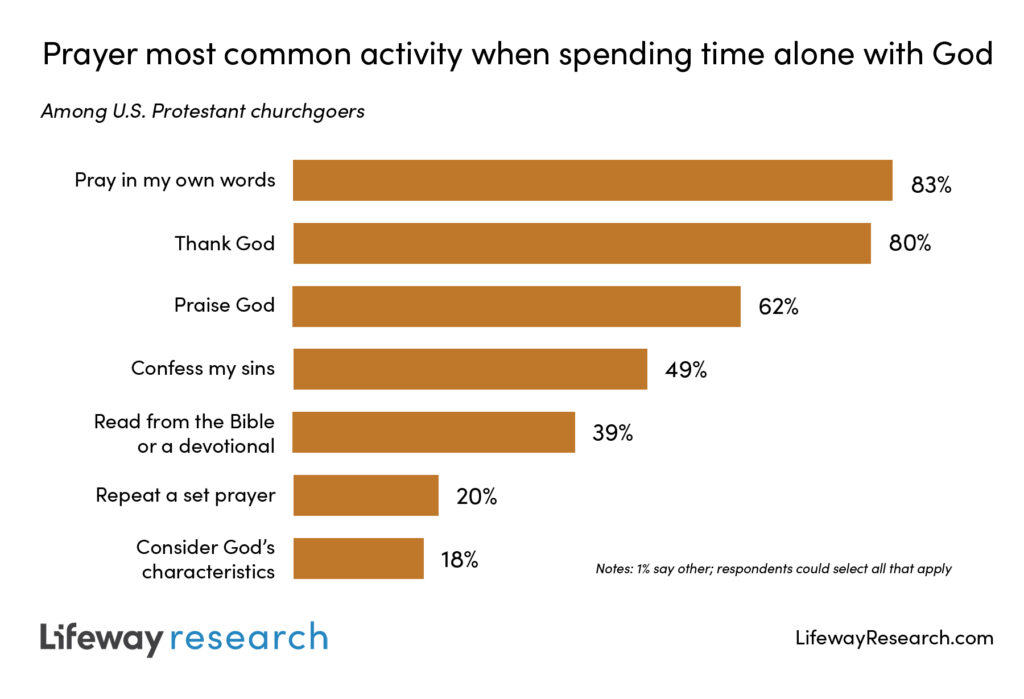Preferences on Practice
What it means to spend time alone with God varies from person to person. But there are some indicators of which practices are most important to different demographics of people. While females are more likely than males to say they praise God (66% v. 57%) or read from the Bible or a devotional (42% v. 36%), men are more likely than women to say they consider God’s characteristics (21% v. 16%) when spending time alone with Him.
Older churchgoers—those 50-64 (45%) and older than 65 (42%)—are more likely than those 18-34 (32%) and 35-49 (34%) to say they read from the Bible or a devotional when spending time alone with God. And those over the age of 65 are the least likely to say they consider God’s characteristics (10%).

Evangelical beliefs and church attendance frequencies are also indicators of a person’s preferences in spending time alone with God. Those who attend worship services the most (four or more times a month) are more likely than those who attend one to three times a month to praise God (67% v. 53%), confess sins (55% v. 38%) or read from a Bible or devotional (46% v. 28%). And those who hold evangelical beliefs are more likely than those who do not hold evangelical beliefs to thank God (87% v. 74%), praise God (76% v. 51%), confess sin (64% v. 38%) or read from the Bible or a devotional (52% v. 29%). But those without evangelical beliefs are more likely than those with evangelical beliefs to consider God’s characteristics (20% v. 15%).
“An earlier discipleship study from Lifeway Research showed that praising and thanking God is one of the top five predictors of high spiritual maturity,” McConnell said. “This is a widespread practice among churchgoers when they are alone with God.”
Preferences on Resources
Several factors play into what a churchgoer wants to read when spending time alone with God. The youngest adult churchgoers (ages 18-34) are the most likely to read Scripture from an app (40%) and the least likely to read from a devotional book that prints some Scripture (21%). And females are more likely than males to say they would prefer to read a devotional from an app (9% v. 4%).
“Today’s Christians have more resources than ever to aid them in spending time with God and His Word,” McConnell said. “As new resources are created, they can encourage someone who, without that innovation, wouldn’t have spent time with God. But there is also a strong relationship between spending time alone with God’s Word and worshiping frequently with others who may encourage you in your walk with God.”
Those with evangelical beliefs are more likely than those without evangelical beliefs to say they would read from a Bible (78% v. 52%) if they were reading something in their time alone with God. And those without evangelical beliefs are more likely than those with evangelical beliefs to say they would read from a devotional book that doesn’t print Scripture (11% v. 3%) or Scripture from an app (22% v. 17%). While those who attend a worship service at least four times a month are more likely than those who attend one to three times a month to say they would read the Bible in their quiet time (70% v. 52%), those who attend one to three times a month are more likely than those who attend more often to say they would read a devotional from an app (9% v. 5%).
For more information view the complete report.
This article originally appeared here.

